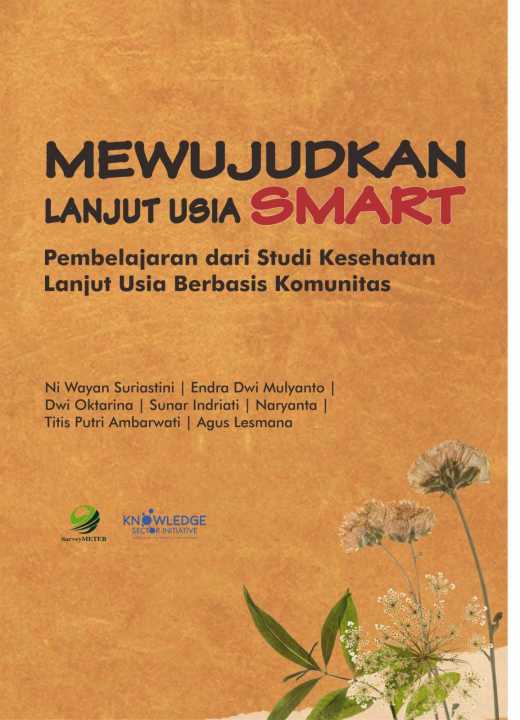Tanggal
24 July 2023
Kata Kunci
Kesehatan dan Lanjut Usia
Lokasi
SurveyMETER
Tipe
Buku
Penulis
Ni Wayan Suriastini, Endra Dwi Mulyanto, Dwi Oktarina, Sunar Indriati, Naryanta, Titis Putri Ambarwati, Agus Lesmana.
Share Artikel:
Actualizing SMART Older Adults: Lessons from the Community-Based Elderly Health Study

Indonesia is currently experiencing an aging population. More than 10% of its population is elderly, with the highest percentage of 15.7% being in the Special Region of Yogyakarta (DIY). The government encourages community-based health service providers to possess the capacity to actualize a Healthy, Independent, Active, and Productive (SMART) elderly population in the policy sphere, one of which is through health screening. SurveyMETER, under the support of the Knowledge Sector Initiative (KSI), conducted a Community-Based Health Study by interviewing all Community Health Centers, 121 Posyandu for the Elderly, and 1,010 older adults Individuals in DIY in 2021.
This study reviews the scope of elderly health screening that is yet to comply with Minister of Health Regulation Number 4 of 2019, particularly that every older adult has the right to receive screening at least once a year. Screening coverage refers to the percentage of older adults receiving health screening at health centers, most of which have not reached 50% yet. There were only two screenings with better percentages: body mass index (51%) and vital sign measurement (54%). The rest are still relatively low, such as examination of egg albumen (23%), hemoglobin (28%), blood sugar (45%), cholesterol (44%), uric acid (44%), and cognitive status as an early detection of dementia (43 %). One of the reasons is the limited human resources and budget to prioritize elderly health screening at Puskesmas. This condition is accompanied by limited knowledge of certain screenings. For example, public knowledge (Posyandu for the Elderly 6% and older adults themselves 5%) about memory disorders as a symptom of dementia tends to be low since Puskesmas is the same provider. Dementia has been normalized as an aging process that is addressed not to require screening and medical treatment. This situation emphasizes that the elderly program has not yet become essential at the Puskesmas until the service is less than optimal, and, if persisted, could prevent the realization of a SMART elderly population.
In addition to the findings above, it also examines other interesting topics such as geriatrics training and long-term care at Puskesmas, as well as the dynamics of Posyandu for the older adults and the conditions of the elderly.
Here is the link to download the book complimentary.
Full version:
Isi:
 5. Langkah yang Diperlukan Guna Mewujudkan Lanjut Usia Smart Berbasis Komunitas
5. Langkah yang Diperlukan Guna Mewujudkan Lanjut Usia Smart Berbasis Komunitas